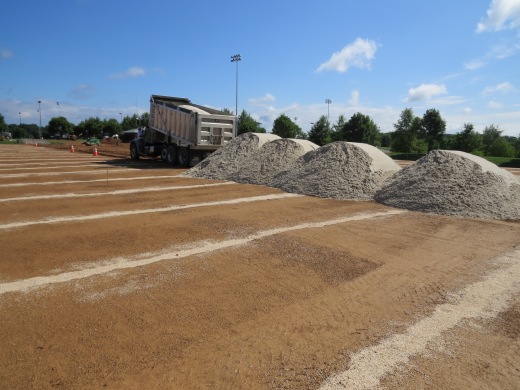Innovation Announcement
Bermudagrass Performance Test
SoccerPlex to Administer Real Time Performance
Test of Four Bermudagrass Varieties
Details: Maryland SoccerPlex to test four varieties of bermudagrass on two re-constructed sand base fields. NorthBridge & Patriot on Field 14, Riviera & Latitude 36 on Field 17. The varieties side by side will provide a real time performance test on sand base fields hosting over 1000 hours of play per year in the Washington, DC region.
Germantown, MD, July 31, 2013: Starting with installation next week, Maryland SoccerPlex will administer a real time performance test of four cold hardy and traffic tolerant bermudagrasses. The varieties are Latitude 36, NorthBridge, Patriot, and Riviera. The bermudagrass will be installed on 2 fields currently being re-constructed with sand base root zones for the fall season.
The performance test is a continuation of the SoccerPlex mission “to be an innovative leader in sports field and environmental management”. The goal is to compare and contrast the four grasses on fields consistently under heavy use while receiving the same maintenance practices.
“When selecting a bermudagrass for our new fields, we have four excellent options”, says Jerad Minnick, who oversees the SoccerPlex Grounds Management and Field Development operation. “Each variety has had success in different situations, but never have they all been compared in the same situation. This test gives us the opportunity to compare and contrast the varieties head to head under heavy use with our aggressive maintenance practices. We will develop an understanding for which variety is best for not only us, but for others with high traffic bermudagrass fields as well.”
SoccerPlex Fields 14 & 17: Fields 14 & 17 are being re-constructed from a native clay soil base into sand base fields. With the installation of sand, Fields 14 & 17 will host more matches and trainings, as sand does not compact from foot traffic like soil. Also the sand base will allow Fields 14 & 17 to be exempt to rain cancellations, just as SoccerPlex Stadium (which is sand).
Follow the progress of the construction, the performance test, and all other SoccerPlex Grounds & Environmental Management practices at www.soccerplexgem.wordpress.com or by following Seed_McGrass, the SoccerPlex Field Spokesman on twitter.

















